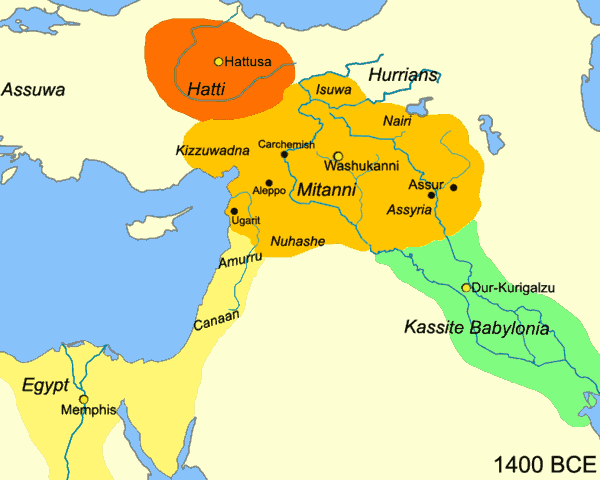Amenhotep III, Sarah, Abraham, & Joshua
© Charles Chandler: Abraham's father was born a Brahmin in India, meaning that he was in the highest class of society — Hindu priests, scholars, & teachers were higher in status than even the rulers & warriors. But his destiny was not to stay in India, for he had the opportunity and desire to travel. Royal courts in his day fancied foreign ambassadors, who brought new ideas that could prove useful. They also brought fresh genes. In the interest of stronger claims to hereditary titles, royals preferred to breed only with other royals. But they didn't want to mate within their own families, because inbred children tend to be infirm. So whenever they got the chance, they stirred up the gene pool by liaising with royalty from other countries, especially if the ambassador was robust in character & physique.: He traveled to Babylonia, where Abraham was born. We know the son not by name, but just by title — he was raised as a Brahmin, which comes down to us as Abraham. To be in that class of society, both of the parents had to be royalty. So Abraham's mother would have been the wife of the lord of Babylonia.: From there, father & son ventured to Harran, the capital of Mitanni, where Sarah was born. Like her half-brother, we know her by title instead of name — Sarah in Hebrew means princess. In Harran, being that can only mean that she was the daughter of the queen of Mitanni (i.e., the wife of Shuttarna II). But by then, the Hindu ambassador was 80 years old, and on passing shortly thereafter, Abraham & Sarah were adopted by Tushratta, the crown prince of Mitanni. His nickname was Terah, who gets credit in the Torah for fathering the Brahmin & the Princess, though Tushratta was actually the foster father.: The extent of Mitanni continued to grow, and judging by the Hurrian names of people and places in Canaan, there was a steady migration of Mitannians into Egyptian territory, enabling further expansion.: Tushratta favored Abraham, even over his biological sons. But Abraham was adopted, and not even a native Mitannian, leaving the biological sons with stronger claims to the throne, who insisted that Abraham be sent away. Sarah was then 15 years old, and was sent to marry Amenhotep III, the future pharaoh of Egypt, with Abraham as escort.: Joshua began organizing the Bedouins on the East Bank.1: In Egypt, the dominant Amun priesthood feared the ever-increasing influence of the Mitannians. With the pharaohs marrying Mitannian princesses, and with Brahmins evangelizing Hindu ideas at court, the allegiance of the empire was shifting away from the Amun priests, which didn't please them. So they pressured Amenhotep III into expelling Abraham & Sarah. But they couldn't just send the Brahmin & the Princess back to Mitanni, which would have renewed political rivalries there. Rather, Abraham was granted an administrative position in Canaan, on the condition that he & his heirs swear their allegiance to Egypt. At the time, the chiefs of the towns in Canaan answered directly to the pharaoh, so Abraham wasn't a governor or a vassal king — he was simply the pharaoh's agent, thereby not having enough autonomy for his name to appear in Egyptian records. By keeping him on the Egyptian side of the line, the Mitannians were OK with the deal, and with him out of Egypt, the Amun priests were happy. Then, to limit his popularity in Canaan, the pharaoh attempted character assassination. Sarah was blamed for "serious diseases" she had supposedly brought to Egypt. Amenhotep III proceeded to commission more statues to Resheph (the Canaanite god of the plague) than to all other gods combined, calling attention to the fear of the plague, and thus magnifying the fear of anybody who might be carrying it, such as the accused Abraham & Sarah. Note that in ancient times, there was no distinction between physiological and psychological illnesses, all of which were believed to be manifestations of being on the bad side of the gods. So if Amenhotep III could convince the general public that the Brahmin & the Princess were diseased, the people would be as scared of Abraham's prophesy as they would the plague, figuring that the two were coupled. Still, Abraham & Sarah married and gave birth to Isaac, who they raised in the Hindu tradition.: Abraham successfully led a revolt of 5 cities on the East Bank against their Elamite overlord, bringing them into the Egyptian empire. (This could have been with the assistance of Joshua.) This made him popular on the West Bank, as well as in Mitanni & Egypt, where the Elamite influence had been resented. Unfortunately, Abraham's popularity was always his weakness, because a popular outsider is always resented by the existing power structure. This is why he had been expelled from Mitanni in , and from Egypt in . Now he had proved himself to be a capable military leader in Canaan, and had endeared himself to the Canaanite chiefs by giving them the spoils from the battles. This didn't please the pharaoh.: An earthquake leveled fortifications at Jericho. Joshua took advantage of the chaos to sack Jericho and other towns on the West Bank, splitting the spoils with Abraham. The Canaanite chiefs complained bitterly, but Amenhotep III did not send troops in their defense, so the Habiru raids continued. Since Abraham was profiting from the anarchy, his popularity in Canaan suffered.
References
1. Judges 11:26 (DH) ⇧











